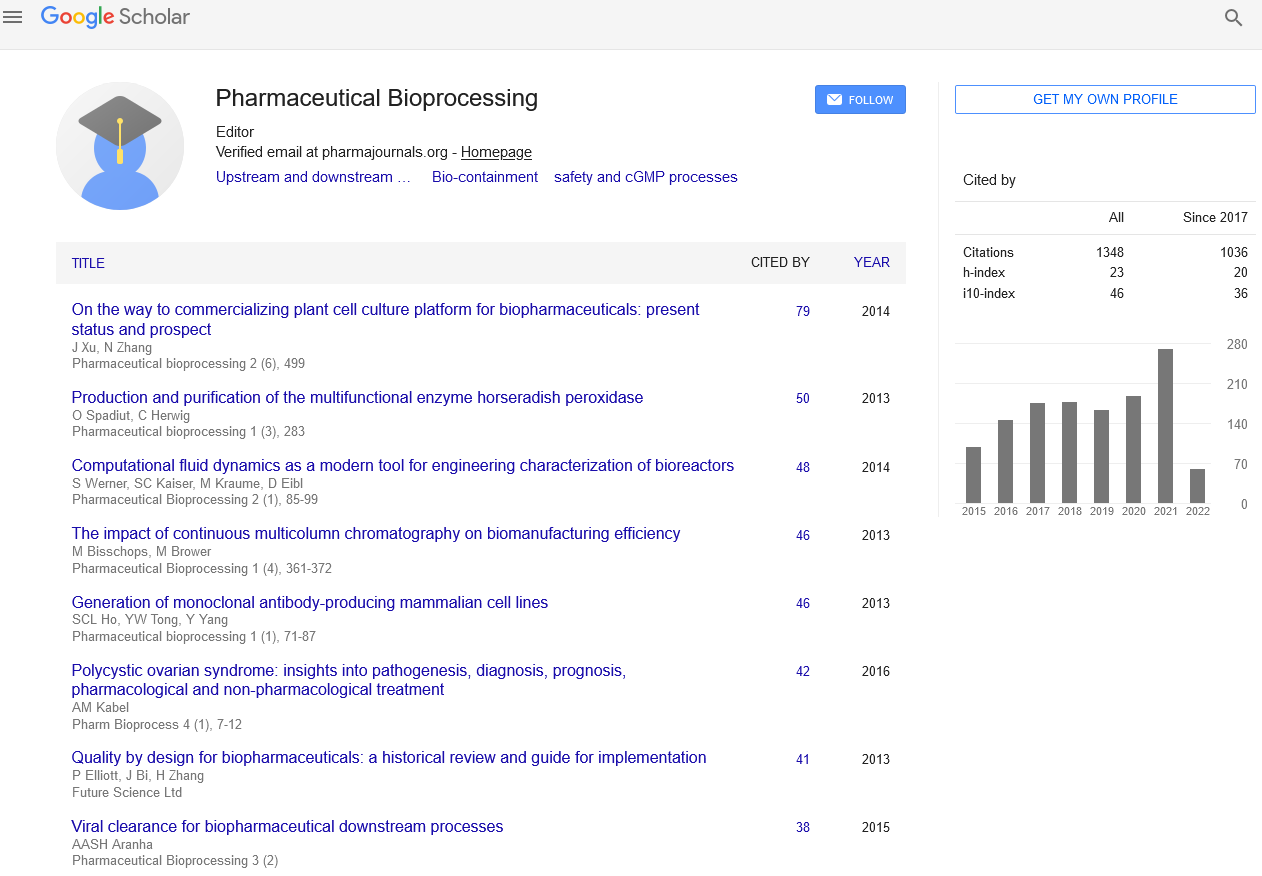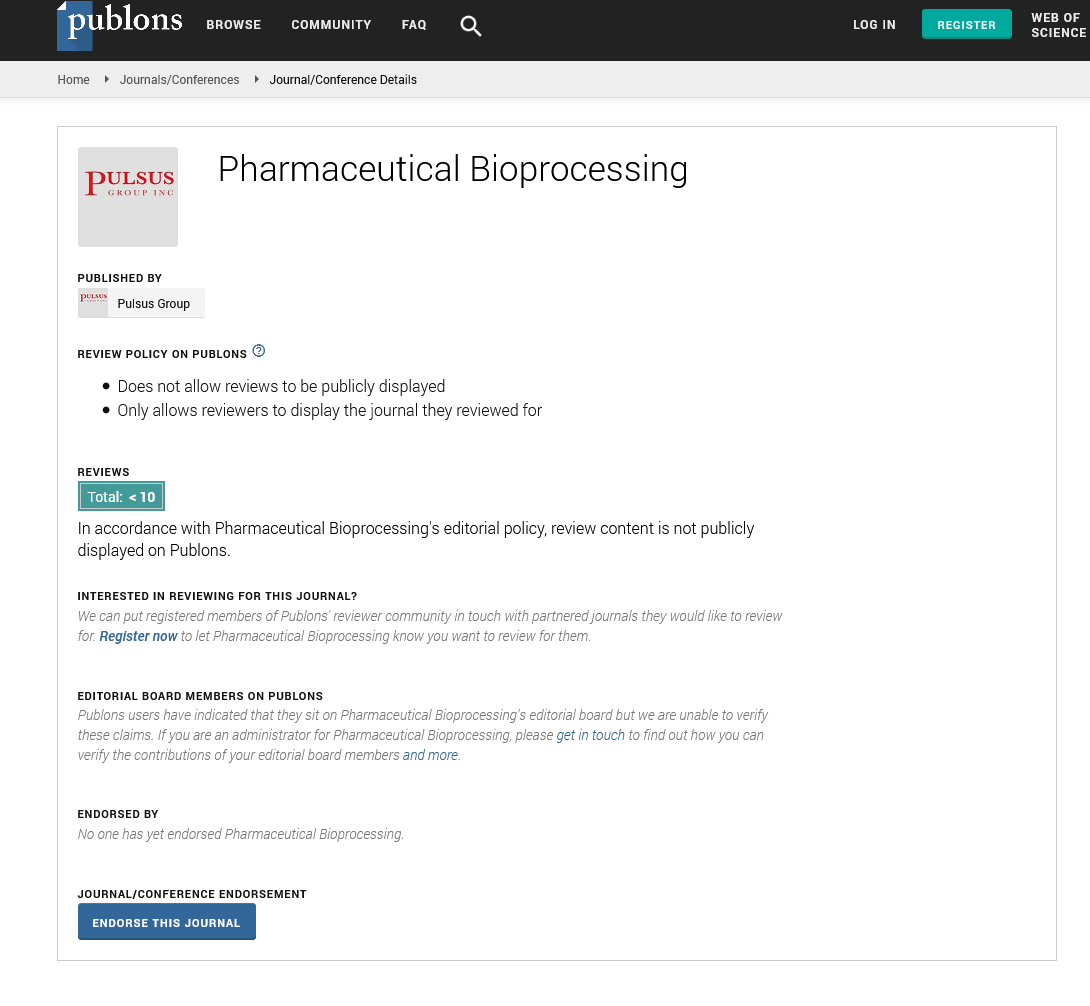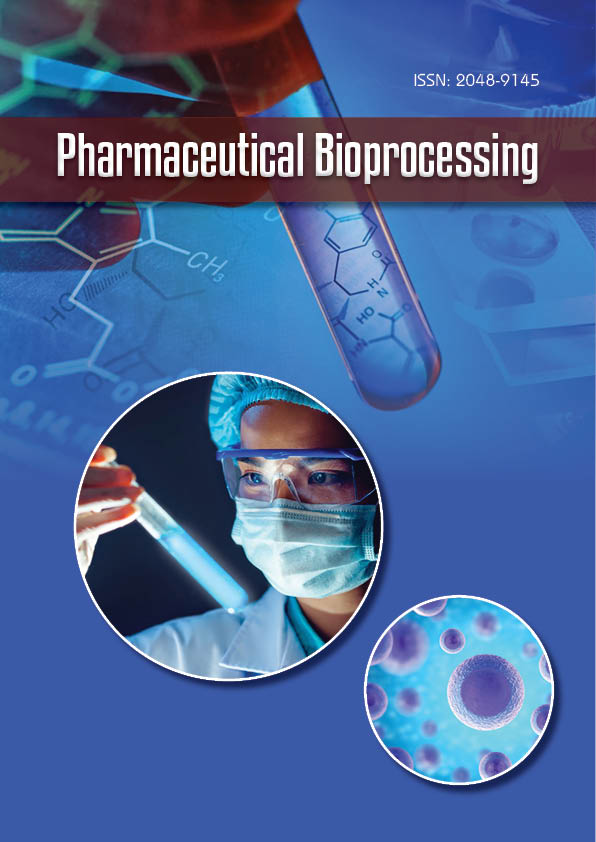Perspective - Pharmaceutical Bioprocessing (2024) Volume 12, Issue 5
Bioformulation: The Science of Designing Effective Biopharmaceutical Products
- Corresponding Author:
- Ashok K. Chopra
Department of Pharmaceutics,
Banaras Hindu University,
Varanasi,
India
E-mail: Achopra.nk@utmb.edu
Received: 06-Sep-2024, Manuscript No. fmpb-24-147518; Editor assigned: 11-Sep-2024, PreQC No. fmpb-24-147518 (PQ); Reviewed: 24-Sep-2024, QC No. fmpb-24- 147518; Revised: 01-Oct-2024, Manuscript No. fmpb-24-147518 (R); Published: 28-Oct-2024, DOI: 10.37532/2048-9145.2024.12(5).225-225
Introduction
Bioformulation is a critical field within biopharmaceutical development that focuses on designing and optimizing the formulation of biological products. This science bridges the gap between raw biological substances and their final therapeutic applications, ensuring that these products are safe, effective and stable. As biopharmaceuticals become increasingly central to modern medicine, the importance of bioformulation in the development process cannot be overstated. This article explores the key aspects of bioformulation, including its significance, challenges and future directions.
Description
The essence of bioformulation: Bioformulation involves the development of a stable and effective formulation for biological products, including proteins, peptides, nucleic acids and cells.
The formulation process involves selecting appropriate excipients, determining optimal storage conditions and developing methods for administration.
The significance of bioformulation
Ensuring product stability: One of the primary challenges in bioformulation is ensuring the stability of biological products. Unlike small-molecule drugs, biopharmaceuticals are sensitive to environmental factors such as temperature, pH and light. Formulation scientists must develop conditions that preserve the integrity of the product throughout its shelf life and during storage and transportation.
Stability studies are conducted to understand how different factors affect the product. These studies help identify appropriate storage conditions and packaging solutions to maintain product quality. For example, proteins may require lyophilization (freeze-drying) to prevent degradation.
Enhancing bioavailability: Bioavailability refers to the proportion of a drug that reaches systemic circulation and is available for therapeutic action. Formulation scientists work to enhance the bioavailability of biological products by optimizing the delivery system. This may involve selecting suitable delivery routes and designing formulations that improve absorption and distribution.
For instance, Monoclonal Antibodies (mAbs) are often administered via injection because oral delivery would be ineffective due to degradation in the gastrointestinal tract. Advanced delivery systems, such as nanoparticles or sustained-release formulations, can also be employed to enhance bioavailability and control drug release.
Ensuring patient acceptability: Patient acceptability is a crucial factor in bioformulation. The formulation must be designed to meet patient needs and preferences, such as ease of administration and minimal side effects. For example, patient-friendly formulations, such as pre-filled syringes or oral tablets, can improve adherence to therapy and overall patient experience.
Challenges in bioformulation
Complexity of biological products: Biological products are inherently complex and their formulation presents unique challenges. Proteins and peptides, for example, can be prone to aggregation, denaturation and enzymatic degradation. Formulation scientists must address these challenges by carefully selecting excipients and optimizing formulation conditions.
The complexity is further compounded by the need to balance stability with bioactivity. Formulations must preserve the active structure of biological molecules while preventing degradation.
Regulatory requirements: Regulatory agencies, such as the FDA and EMA, impose strict requirements on the formulation of biological products. Compliance with these regulations involves extensive documentation, validation and testing. Bioformulation must adhere to Good Manufacturing Practices (GMP) and demonstrate that the product is safe, effective and of consistent quality.
Cost and time constraints: Developing and optimizing bioformulations can be timeconsuming and costly. The need for extensive testing and stability studies can increase the cost of development. Additionally, the iterative nature of formulation development requires significant investment in research and development resources.
Future directions in bioformulation
Advancements in delivery technologies: Future developments in delivery technologies are likely to enhance the efficacy and convenience of bioformulations. Innovations such as smart drug delivery systems, personalized medicine and non-invasive delivery methods are on the horizon. For example, research into oral delivery of biologics and the development of transdermal patches could revolutionize the administration of biological products.
Integration of artificial intelligence and data analytics: Artificial Intelligence (AI) and data analytics are increasingly being integrated into bioformulation processes. AI can assist in predicting the stability of formulations, optimizing excipient selection and identifying potential issues early in the development process. Data analytics can provide valuable insights into formulation performance and guide decisionmaking.
Personalized and precision medicine: The trend towards personalized and precision medicine requires bioformulations tailored to individual patient needs. Advances in genomics and biotechnology enable the development of formulations that address specific genetic or physiological characteristics. Personalized formulations have the potential to improve treatment outcomes and minimize adverse effects.
Conclusion
Bioformulation is a critical discipline in the development of biopharmaceutical products, playing a key role in ensuring product stability, enhancing bioavailability and improving patient acceptability. Despite the challenges associated with formulating complex biological products, advancements in delivery technologies, AI and personalized medicine offer promising opportunities for the future.
As the biopharmaceutical industry continues to evolve, the importance of bioformulation will remain central to delivering safe, effective and patient-centered therapies. By addressing current challenges and embracing innovative approaches, bioformulation scientists and developers can contribute to the advancement of medical science and the improvement of patient outcomes.


